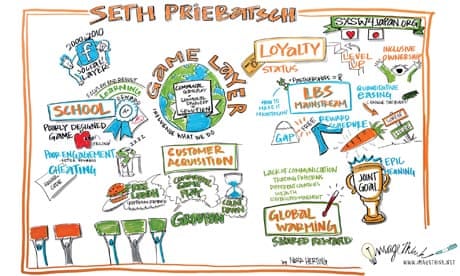Seth Priebatsch unleashed 180 seconds of organised chaos on SXSW Interactive on Saturday, turning the 4,000-strong audience into a giant trading pit. The charismatic, high-speed founder of business location tool SCVNGR wanted to show how game dynamics – in this case based on the classic card game Pit – can help solve real problems, giving everyone in the audience a coloured card to trade as a metaphor for organising action around climate change. It's all part of his vision for the next generation of the web, one he describes as "the game layer".
The card-trading game was, he admitted, a bit of a gamble – he even had an alternative "consolation on your failure" slide lined up just in case. He was only about 60% sure it would work on this scale, but the room was buzzing with energy. "Climate change is a complex problem with no central lever, and with unequal distribution of resources. But I was confident in those game mechanics, that it would be exhilarating and that we could analyse the dynamics to show what had happened. If we can tie all that back into what we do, then even if we can't tackle problems as big as global warming, we can make them more manageable."
SXSW Interactive keynotes are notoriously pressurised, with big audiences, big expectations and a high bar; recent keynotes have included interviews with Facebook founder Mark Zuckerberg and Twitter co-founder Evan Williams – both of which saw interviewers Sarah Lacy and Umair Haque being subsequently slated. That Priebatsch was singled out for his moment of glory shows not only the popularity of both location-based services and the mainstreaming of games, but also confidence in the 22-year-old to hold the attention of an expert 4,000-strong audience for an hour.
SCVNGR, which until recently had a low profile compared with the less commercially focused Foursquare and Gowalla, claims to be enjoying something of a boom. The service reached the milestone of 1 million users in late February, is about to be included as a native app on 4G Sprint Android handsets and, on the back of a $15m funding round in January, has announced its first major new project. LevelUp will see SCVNGR offer local businesses in Boston and Philadelphia a tiered loyalty scheme for customers that incentivises them to keep coming back to get better discount deals at shops, restaurants and local businesses. "The goal is to take the level-up game mechanic and implement it in the real world. One problem of the daily deals space is that it creates a local, social deal but doesn't get users to come back. And though there are 500 Groupon knockoffs in the daily deals space, no one is talking about loyalty."
While the explosion of daily deals sites has created some eyewatering valuations in a very short space of time – Groupon stands at around $15bn compared with SCVNGR and Foursquare's $100m valuations, said Priebatsch - SCVNGR's careful, analytical and long-term approach could start to give those sites some real competition. "At the moment, only 4% of internet consumers use location-based services," said Priebatsch. "We've made a commitment to these research pilots to help move location-based services to the mainstream, an open way of inviting people back and making that business a more persistent part of their life. It's not just about checking in – we want them to level up into regulars.
"We are going to give them some nightmares, for sure. Groupon and Livingsocial are not going to be worried in the short term about anything we do because they are so big and making so much money. But they are not doing a good job because it's not enough to do 'one and done-ers'." This, said Priebatsch, is where the "superior implementation" of location-based services has such massive potential, because once the hype of daily deals sites dies down, businesses will start to question giving away high margins in discounts to customers who don't come back. "We haven't done it in a way that is mainstream yet, but as soon as we do they will have a lot to worry about."

That SCVNGR is pushing into one of the web's most lucrative areas, the daily deals space, says much of its ambitions. Priebatsch is unashamedly focused on applying his expertise and ambition to what he described as this "hybrid space" between location services, deals, local businesses and more pure forms of gaming. But referencing influential games designers Jane McGonigal and Jesse Schell in his keynote, he acknowledged that he has felt some push-back from more purist members of the games community over whether SCVNGR can really be described as a games firm.
"We're pushing the limits of what a game is, and they think I'm beyond this limit. There will always be purists but we've never got that push-back from businesses or consumers. Game dynamics are too powerful to leave bottled up in games." Priebatsch is also determinedly hands-on. Though games such as McGonigal's World Without Oil and CryptoZoo (which she designed for the American Heart Association) have a higher purpose, he seems to want to get his hands dirty with more tangible, business-facing projects. That impulse to see a result has led to a string of experimental campaigns, including a recent project with fast food chain Buffalo Wild Wings that garnered up 33,000 new users and saw 30% of them come back within seven days. The trick was setting challenges for users based around a basketball theme, so gamers had to take photos of themselves with players or complete tasks for a chance to win tickets to games as well as discounts at the restaurant.
"Crack the science of loyalty at scale for local business and that becomes something that can add a huge amount of value to an important sector of our economy. I like tackling problems that I can see making an impact on real people and real businesses immediately. We might not be purists, but we're a long way from being one of the Enrons of the world."
His mantra is "instilling a sense of engagement between a business or brand and a person". That may seem a rather commercial message for the artsy SXSW crowd, but his objectives seem more high-minded than many of the increasingly marketing-focused sessions at SXSW. As he noted, with a marketing spend of close to $60m this year, some of the festival's technology grassroots seem to have been taken over by marketers.
Priebatsch likes to refer to himself as a "proud Princeton dropout", displaying a virtual badge of geek pride for leaving his engineering degree after just a year so that he could pursue SCVNGR. "We are all naturally selfish, so if there is this great tech innovation from the social layer to the game layer, people want to do 'what can it do for me?'. School is the perfect ecosystem for something like that, for engagement – could you fix schools using game mechanics?"
If the third era of the web is to be defined by what Priebatsch describes as the game layer, how comprehensive can that layer really be? Last year's EpicWin iPhone app showed how points and incentives can be tied to dull daily chores, but don't more commercial attempts to "gameify" the everyday risk adding nothing but a superficial layer of dynamics? Don't we risk building an industry that reduces friendship to the accumulation of points? "I don't use 'gameification' to describe the things SCVNGR does or the things we're trying to do because it describes this activity of bolting on game mechanics, whereas we like to think of building a new framework from the ground up where game mechanics are an integral part of the process," said Priebatsch. "If you're selling dog food, you can't just add game mechanics. We want to reclaim the term 'gameification' to mean something grander than just sprinkling something on top."
Both Groupon and Foursquare are rivals. But surely Facebook, with its recent moves into check-ins and local business deals, must also present some intimidating competition? Priebatsch dismisses much of what Facebook has done in the local business deals space as "one-dimensional"; even its launch deal offering 10,000 pairs of jeans to Gap customers was just the result of both companies' top brass talking, he says. That's not a sustainable way of building the service, Priebatsch argued – and he claimed SCVNGR can back that up with research into the longevity of Facebook Deals customers. "I've never felt threatened by Facebook. The frightening thing would be if they had got people to keep checking into Gap regularly. Did that happen? No, because the experience is not that rich or engaging," he said. "But Facebook has the most to lose because it has a history of altering its privacy policies and not doing the most to protect the privacy of its users."
If Facebook lacks "the science of loyalty" and the absolute trust of its users, doesn't it make up for that in scale? "It will pass, said Priebatsch. "Facebook will be like Google, Microsoft and IBM before them – they've been dominant for maybe a year and I'd give them maybe four more years."
That's a shift, he said, that is inevitable – but it is clear from Priebatsch's raw ambition and tenacity that when Facebook's reign is over, that's right where he wants SCVNGR to be. "Shift happens! I'm working like hell to make that shift happen and be on the right side of it."









Comments (…)
Sign in or create your Guardian account to join the discussion